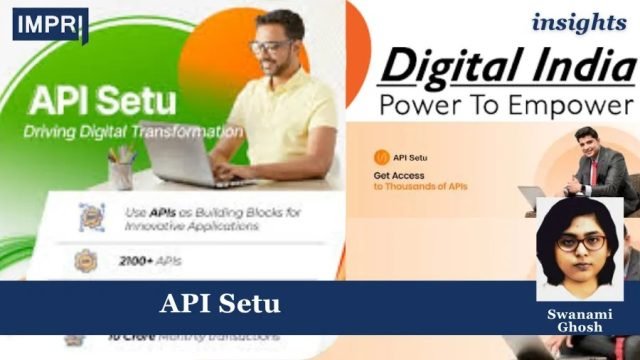Policy Insight
Swanami Ghosh
Background
API Setu, an Open API (Application Programming Interface) Platform from the Ministry of Electronics and Information Technology (MeitY), Government of India, is a foundation for India’s digital transformation journey. The platform began with an ‘Open API’ policy from MeitY in July 2015, to create an open and interoperable digital platform. Consequently, API Setu was initiated in March 2020 to enable the delivery of services across all departments. This provides a safe and reliable way to share information in e-Governance applications, encouraging civic engagement.
API Setu is part of the Digital India initiative, implementing the principle of “Power to Empower”, by enhancing technology accessibility. API Setu is a solution to various barriers to entry such as, lack of API availability, proprietary standards, lack of common data standards, and N-to-N connections for API access by treating the issues more recursively, as balancing centralized governance and common policies for governance.
Challenges without API Setu: {as mentioned above}
Source: https://docs.apisetu.gov.in/document-central/explore-apisetu/_images/Data_Publishers.png
Solution : {as mentioned above }
Source : https://docs.apisetu.gov.in/document-central/explore-apisetu/_images/Features.png
Functioning
API Setu serves as a single API marketplace, making the discovery, subscription, and consumption of APIs easier, all while properly securing data access and services. It enables the user to utilize APIs free from complicated change modules, bridging the gap between the publisher and consumer of the API.
The two primary roles are :
Publisher Registration & API Publishing:
Publishers go to the API Setu platform to register (for example, via https://partners.apisetu.gov.in/signup) and submit a valid use case along with documents to register an account (Proof of Identity, Authority Letter, Organization PAN, GST registration certification, and Certificate of Incorporation).
After registering, they can then add new APIs by uploading API file(s) adhering to OpenAPI Specification 3.0 – most preferably YAML format.
Publish API option will allow publishing the API onto the API Setu marketplace to allow discovery by consumers. The publisher can then manage API clients, control quotas, and evaluate API use and performance.
Consumer Registration & API Subscribing:
Consumers will register with API Setu, discover, and subscribe to APIs. When approved, they will be able to subscribe to the API(s), generate API keys, and implement these APIs in their applications to perform data exchange.
Source: https://docs.apisetu.gov.in/document-central/explore-apisetu/_images/Arch.png
Performance:
API Setu has generated a considerable level of traction and impact since its launch:
- API Publication: As of August 2020, API Setu has acquired 2617 APIs published on the platform.
- Publisher Base: 1143 publishers to date are contributing APIs to the platform.
- Consumer Base: 373 consumers on the platform utilizing APIs.
- Transaction Volumes: API Setu has over 6 crore transactions on a monthly basis, indicating significant volumes of data exchange.
- Policy Implementations: MeitY continues to release circulars to ensure the Open API policy is adopted effectively by creating an obligation for government organizations to publish their APIs on API Setu so that they can be accessed and integrated.
Impact in key sectors:
The API Setu platform has made a major difference in the domain of e-governance and digital delivery of services in India by helping multiple industries, and we hereby see the impact in key sectors :
- Public Service Delivery
API Setu is the partner of choice for large initiatives within Digital India Programs, for instance, DigiLocker, MeriPehchaan, National Academic Depository (NAD), My Scheme, and UMANG. It represents the more integrated evolution of e-Governance.API Setu fundamentally accelerates the full-scale digital transformation of government services, providing easy, effective, and accessible service delivery to citizens in support of their needs.
- Employment and Recruitment
API Setu enables the verification of academic qualifications and work history using DigiLocker, underpinned by information sources involving EPFO and the university’s degree roll records. API Setu allows the applicant to qualify easily, if legitimate, saving time and engagement in terms of required background checks undertaken on behalf of the employer, and it builds confidence in candidate data.
- Procurement and Vendor Management:
For organizations onboarding vendors, API Setu authenticates relevant documents including but not limited to Goods and Services Taxpayer Identification Number (GSTN) and Importer Exporter Code (IEC).It limits deceptive vendor applications and speeds up the procurement process, providing reliable supply chain solutions with ethical business practices.
API Setu provides verification of applicants’ proof of income certificates for credit and loans, bank statements as proof of employment and income for government and privately led initiatives for benefits, and verification of account statements from various participating banking partners.These help verify applicants who are fraudulently applying for receipts or completing details through i.e. E-KYC on bank letters, and completing the entire disbursement and documentation process, without any human intervention which makes financial services more organized, secure and inclusive.
Insurance companies listed on API Setu can provide their customers a seamless experience by using some of the services directly or indirectly related to the KYC process.The experience to the customers has vastly improved compared to earlier which included much longer time for claim settlement, issuance of new policy; viewing and sharing nominee information and expiry reminder to the customer. Overall the experience has improved significantly with less processing time for both the customer and customer service department of the business.
During the COVID-19 pandemic, API Setu expanded capability with healthcare APIs like the CoWIN APIs to allow partners to rapidly build out applications for booking vaccination slots, vaccination application for the vaccinator app for centres, and generate certificates for vaccinations. The increased functionality of API Setu through a practical even urgent need will help accelerate the development of increasingly complex applications, which are crucially important for effective mass vaccination programs, and engage API Setu as an important intermediary in emergency response and public health delivery by using a wide variety of healthcare systems with instant access to significant health services.
Way Forward:
API Setu is much more than just a technical platform; it is also a strategic enabler of India’s Digital Transformation path, in pursuit of “New India.” “API first” strategy allows government entities to create responsive digital governance by opening up and connecting the silos in India’s e-governance ecosystem. The ongoing growth of API Setu in terms of published APIs, publishers and consumers is demonstrating the realisation of a future where government services can be delivered in an accessible and interoperable manner. In future, more work is required by India to build on the levels of data quality, scale and levels of engagement, governance and privacy.
Ultimately, API Setu will not be measured on the number of service transactions or types of APIs, but rather how it helps to empower citizens by innovation and economic development, delivering seamless digital interactions by digitizing public services for a more efficient and transparent digitally enabled India.
References:
- API Setu. (2015). Open API powering agile service delivery. In API Setu – Open APIs for Digital Transformation [Press-release]. https://egovstandards.gov.in/sites/default/files/2023-05/Open%20API%20-%20Powering%20Agile%20Service%20Delivery_0.pdf
- DigiLocker: an initiative towards paperless governance. (n.d.). DigiLocker. https://www.digilocker.gov.in/web/data-exchange
- Digital India: MeitY, Government of India. (2024, July 30). API SETU – Digital India | Leading the transformation in India for ease of living and digital economy | MeitY, Government of India. Digital India | Leading the Transformation in India for Ease of Living and Digital Economy | MeitY, Government of India. https://www.digitalindia.gov.in/initiative/api-setu/
- Ministry of Electronics and IT. (2024). Standard Operating Procedure (SOP) for consuming API through API Setu [Report]. https://cdn.apisetu.gov.in/portal/assets/sop-apisetu-v1.pdf
- Rawat, K. (2024, June 19). API Setu (API Market Place) Use Cases – APISetu | blog. https://blog.apisetu.gov.in/api-setu-api-market-place/
- Setu, A. (n.d.). API Setu: Get access to thousands of APIs. https://apisetu.gov.i
About the author:
Swanami Ghosh, economics undergraduate student in Miranda House, DU and a Research intern at Impact and Policy Research intern at Impact and Policy Research Institute (IMPRI)
Acknowledgement:
The author sincerely thanks Aasthaba Jadeja and IMPRI fellows for their valuable contribution.
Disclaimer:
All views expressed in the article belong solely to the author and not necessarily to the organisation.
Read more at IMPRI:
Bridging the Cognitive Divide: Adaptive Assistive Systems for the Neurologically Challenged
Scheme for Campus Accommodation & Facilities Enhancing Social Experience (CAFES), 2020



















